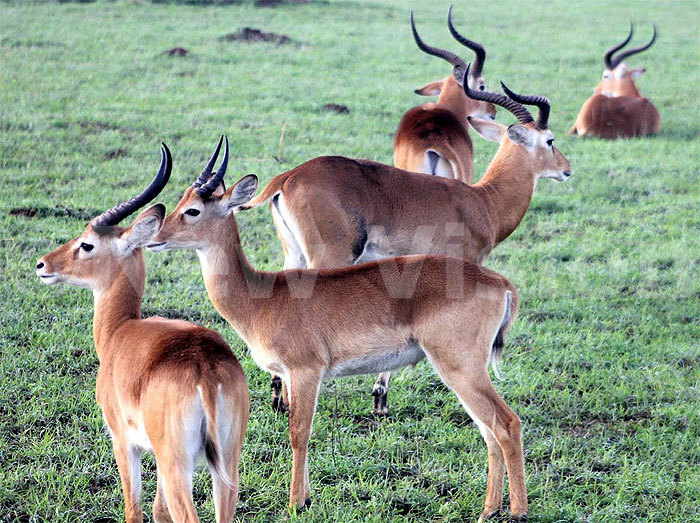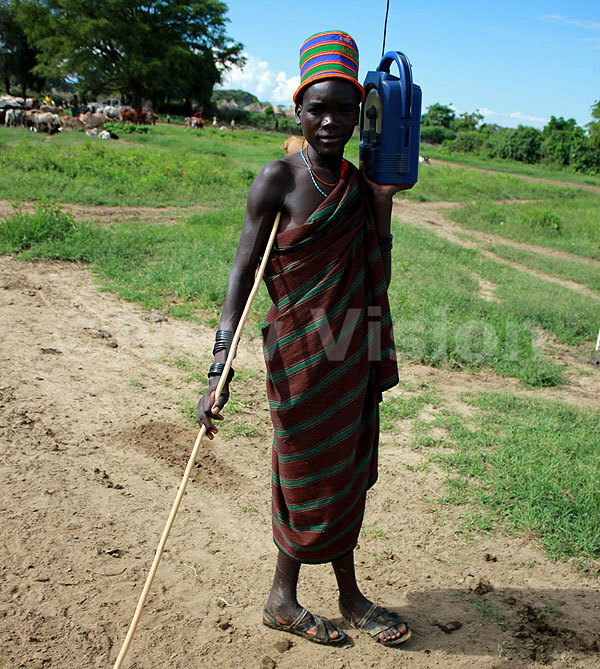Karamoja will not wait for Uganda to develop
The Ik are operating a mobile theater which entertains every interested group for a fee.
Kidepo Valley National Park is accessed after a bumpy ride that lasts more than half a day. If it rains, 4WD cars and heavy-duty vehicles get stuck for hours. Tall men wearing sheets, clutching three-legged stools and brushing their teeth with sticks wait for car-pushing business opportunities.
"Pushing a car [through a muddy surface] for 100 meters costs between sh20,000 and sh50,000," says Lokile in passable English punctuated with Kiswahili. "These cars are heavy. Spending a night here means mosquito bites and malaria."
Lokile is a lanky man from the Ik tribe - a minority group - whom we found at the roadside as we pondered how we would maneuver our stuck Omnibus out of the muddy section of the road.
After that sticky episode, our vehicle finally ground to a halt in Kidepo at around 7:00pm local time. We were 18 travelers altogether.
Next, we booked into the Uganda Wildlife Authority (UWA) bandas (self-contained huts) as moneyed colleagues from Rwanda, Kenya and South Africa went to Apoka Lodge. There they were treated to a sundowner cocktail. Sandwiches, wines and snacks were served and disappeared as if there were a rumor the world would be ending the following day.
"The wine is smooth to the tongue," said Herman Kalanzi of Uganda Ekula, a programme on Bukedde Television that features people and places in Uganda. "But I cannot wait to see the lions, seasonal rivers and the landscape that Kidepo is popular for."

Kidepo is located in north-eastern Uganda.
By 6:00am local the next day, there was a call for us to go for a game drive. Breakfast would be had during the safari ride.
"Take heed while here," cautioned Philip Akorimo, a ranger. "I expect no viewing list of Rock Pythons, leopards, lions or buffalo herds popularized by CNN and travel gurus. This is their natural habitat and not a zoo where they are caged.
"You might or might not see what you want."
"The animals are known to trek up to neighbouring South Sudan and Kenya," said Akorimo.
"They are polygamous and have families across borders like human beings. UWA area manager Steven Nyadru says with swelling human population, the animals are lacking freedom and enough space.
True to his word, bushbucks, zebras and antelopes dine or drink water near Apoka Lodge or the UWA bandas.
"Kidepo is the closest you can get of what Africa was when it was baptized the Dark Continent," says Nyadru. "Its name comes from a local Karamajong word ‘Kidep' (picking). It originated from numerous coconuts in the place. The elephants would shake the tree. Communities nearby would pick the fruits and party."

The climax of the trip was the three-hour Ik trail, where we were treated to a traditional dance of tripping dance mates. The tune was an a cappella crooned by tall men and their energetic women with tattooed bodies.
"We are not Karimojong although some of us have been assimilated because of intermarriages with them," complained an elder, Johnson Lomeri.
"Do you know that our Ik language cannot be written by the computer. There are missing alphabets like a nasal nga."
He said the Ik have their own history, identity, lifestyle, language, dress code, dance and norms.
"There is more to Kidepo than animals," explained Lomeri, very passionately.
"For example, there are communities in the park neighborhood who need public services. Women here prefer traditional birth attendants because hospitals are so far away from their homes. We had our first graduate recently from Kampala University two years ago. When it comes to bride price - it is honey."
Malaria is prevented by sleeping under mosquito nets and drinking camel milk or water from a hot spring when sick. Besides the people and animals, there are places in Kidepo with such panoramic landscapes where rocks hug the sky.
"We are mainly settled farmers unlike our Karimojong pastoral neighbors," said Lomeri. "Until the disarmament exercise they used to raid our homes for food, women and livestock. The removal of guns has made life very different."
The Ik are operating a mobile theater which entertains every interested group for sh50,000 for music, dance and drama of 30 minutes.
Another ranger John Kwete said there are birds that migrate all the way from USA and the European Union (EU). "Even the sky is no limit to how far they fly."
In a nutshell, much as former Ugandan president Milton Obote is quoted to have said "The rest of Uganda will not wait for Karamoja to develop", the opposite is happening.
Mobile phones, for instance, are in use.
While the reading culture is said to be poor in the rest of Uganda, the Ik narrate their history regularly (oral literature). They know their roots to the dot while other Ugandans get westernized.
Through the ministry of gender, labour and social development, they are having their norms and ways of life documented for future generations.